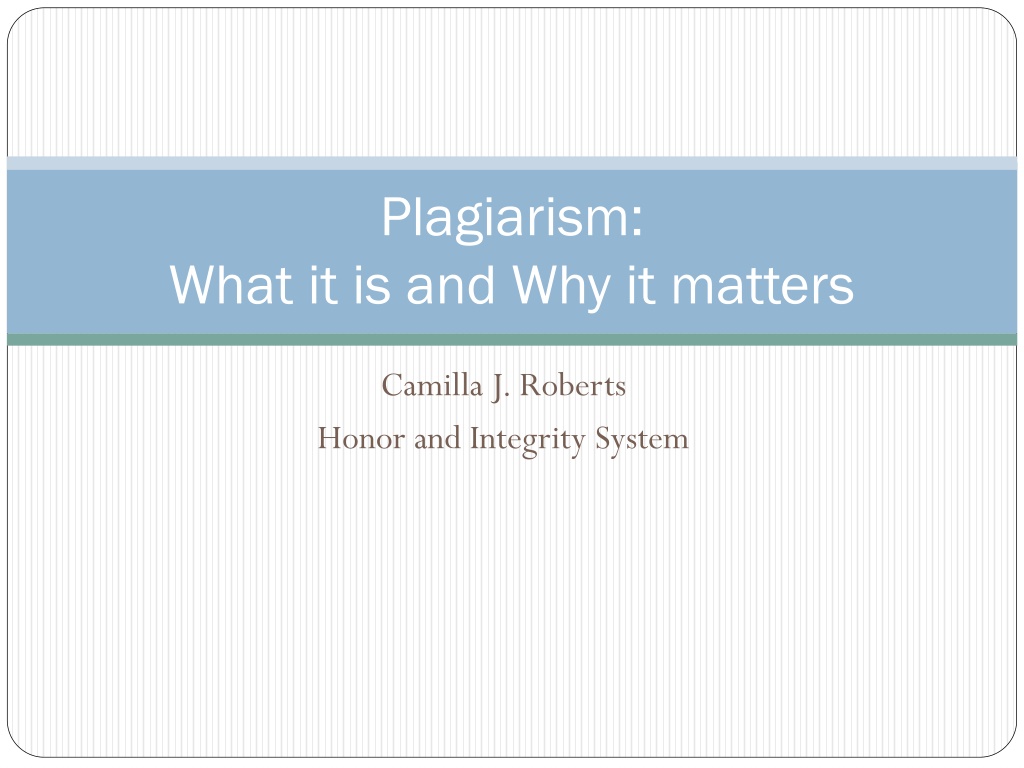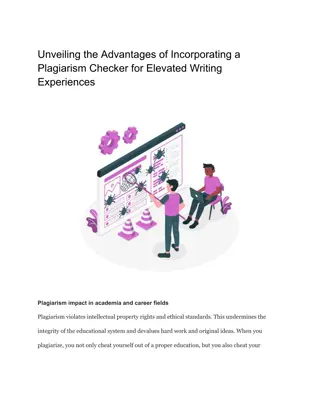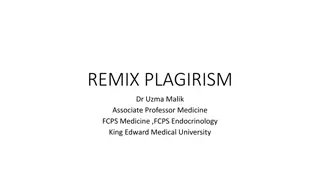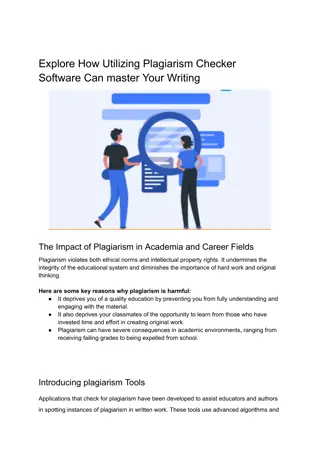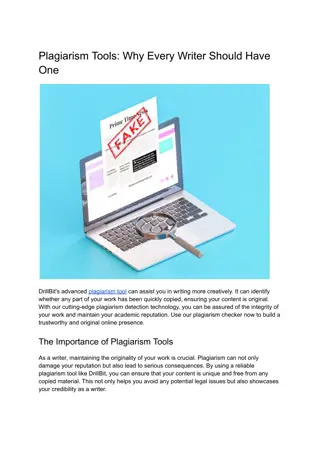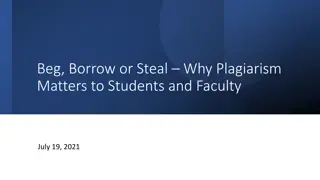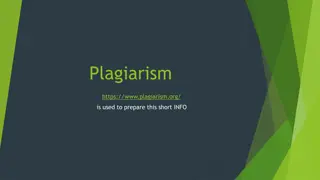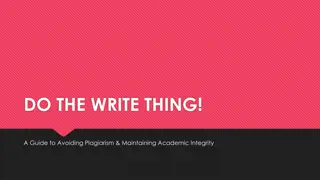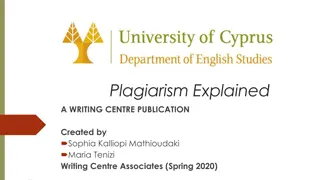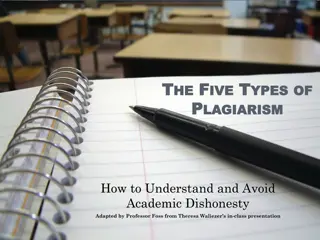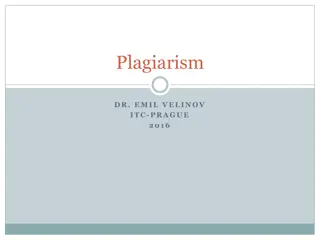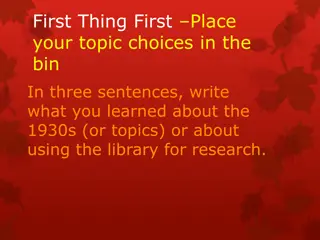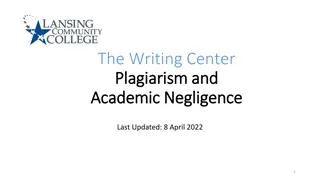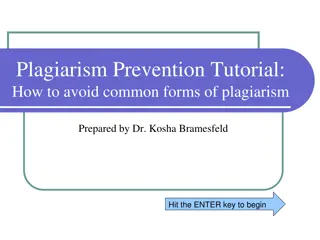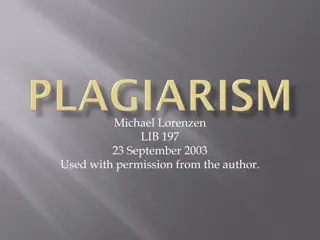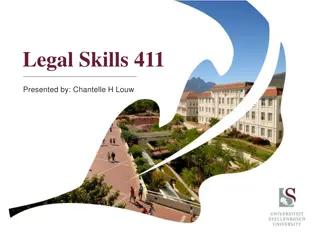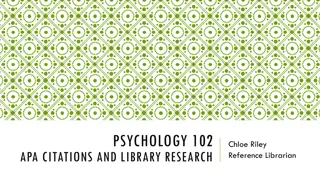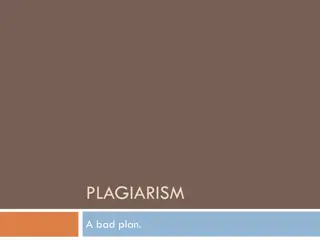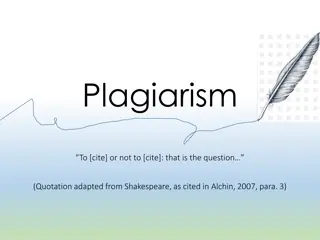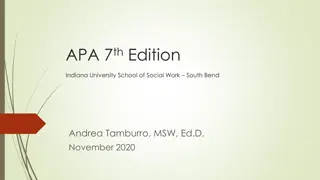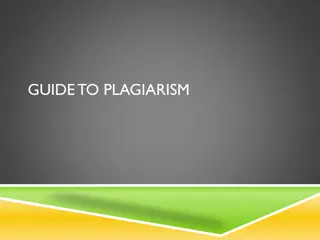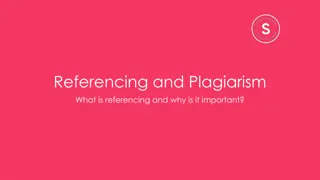Understanding Plagiarism: Importance and Consequences
Plagiarism involves copying someone else's work without giving proper credit, which can have serious repercussions like academic penalties and loss of credibility. It's crucial to distinguish between paraphrasing, proper citation, and original content creation to uphold academic integrity.
Download Presentation

Please find below an Image/Link to download the presentation.
The content on the website is provided AS IS for your information and personal use only. It may not be sold, licensed, or shared on other websites without obtaining consent from the author. Download presentation by click this link. If you encounter any issues during the download, it is possible that the publisher has removed the file from their server.
E N D
Presentation Transcript
Plagiarism: What it is and Why it matters Camilla J. Roberts Honor and Integrity System
What do you know so far? Original version: In analyzing the culture of a particular group or organization it is desirable to distinguish three fundamental levels at which culture manifests itself: (a) observable artifacts, (b) values, and (c) basic underlying assumptions. Source: Schein, E.H. (1990). Organizational culture. American Psychologist, 45(2), 109-119. Student's Version: Values and observations are two tools that might help me in observing the group I will investigate in this study. Is this Plagiarism? http://www.lib.umd.edu/shadygrove/plagiarism.html
YES Paraphrased without citing the source!
Original version: The University counts among its greatest strengths and a major component of its excellence the diversity of its faculty, students, and staff...It strives to hire a diverse faculty and staff of exceptional achievement through affirmative action, to celebrate diversity in all of its programs and activities, and to recruit and retain qualified graduate and undergraduate minority students. Source: Excerpt from the University of Maryland Mission Statement. Retrieved April 11, 2006 from: http://www.provost.umd.edu/Strategic_Planning/Mission2000.html Student's Version: Although some may feel hiring diverse faculty members is not a priority for universities, many schools claim that they strive to hire diverse faculty and staff of exceptional achievement. Is this plagiarism? http://www.lib.umd.edu/shadygrove/plagiarism.html
YES Word-for-word without citing the source!
Original version: Thurgood Marshall's rise to power played out against the backdrop of America's tempestuous history of slavery, Jim Crow segregation, and the civil rights movement...Any attempt to know Thurgood Marshall had to start with his family and his hometown. His defiance of segregation, his willingness to stand up to powerful whites, and his insistence that he was the equal of any man were rooted in his Baltimore family. Source: Williams, J. (1998). Thurgood Marshall: American revolutionary. New York: Three Rivers Press. Student's version: Not all powerful leaders come from a place of power and privilege. On his way to becoming the first African American Supreme Court Justice, Thurgood Marshall overcame racism and segregation to assert his equality and his rights (Williams, 1998). Is this plagiarism? http://www.lib.umd.edu/shadygrove/plagiarism.html
NO Paraphrased and cited the source!
Plagiarism Overview Various types of Plagiarism Overall not giving appropriate credit to the person or persons who originally developed the thoughts and ideas. Plagiarism focuses on both published and unpublished material. Instructors want to know what YOU think in response to what you have read not exactly what you have read.
Types of Plagiarism Word-for-Word Mosaic Word Switch Metaphor Paraphrase without Citation Idea Plagiarism and Common Knowledge Pattern, Organization, or Structure of Arguments and Ideas Submitting Someone Else s Work
Original Text Every time you smile at a messenger, laugh at a coworker s joke, thank an assistant, or treat a stranger with graciousness and respect, you throw off positive energy. That energy makes an impression on the other person that, in turn, is passed along to and imprinted on the myriad others he or she meets. Such imprints have a multiplier effect. And ultimately, those favorable impressions find their way back to you (Thaler & Koval, 2006, p.6). Thaler, L.K. & Koval, R. (2006). The Power of Nice. New York, NY: Doubleday.
Word-for-Word Every time you smile at a messenger, thank an assistant, or treat a stranger with respect, you throw off positive energy. Every time you smile at a messenger, laugh at a coworker s joke, thank an assistant, or treat a stranger with graciousness and respect, you throw off positive energy. That energy makes an impression on the other person that, in turn, is passed along to and imprinted on the myriad others he or she meets. Such imprints have a multiplier effect. And ultimately, those favorable impressions find their way back to you.
Mosaic Positive energy coming from when you smile at a messenger or thank an assistant makes an impression. In turn, this is imprinted on others and will find their way back to you. Every time you smile at a messenger, laugh at a coworker s joke, thank an assistant, or treat a stranger with graciousness and respect, you throw off positive energy. That energy makes an impression on the other person that, in turn, is passed along to and imprinted on the myriad others he or she meets. Such imprints have a multiplier effect. And ultimately, those favorable impressions find their way back to you. Picture from: http://shakespearessister.blogspot.com/2007/03/project-shaker- mosaic-update.html
Word Switch The energy makes an impact on the other person that, in turn, is passed along to the various others he meets. Every time you smile at a messenger, laugh at a coworker s joke, thank an assistant, or treat a stranger with graciousness and respect, you throw off positive energy. That energy makes an impression on the other person that, in turn, is passed along to and imprinted on the myriad others he or she meets. Such imprints have a multiplier effect. And ultimately, those favorable impressions find their way back to you.
Metaphor Plagiarism Positive energy can come from a laugh of a co-worker s joke. Every time you smile at a messenger, laugh at a coworker s joke, thank an assistant, or treat a stranger with graciousness and respect, you throw off positive energy. That energy makes an impression on the other person that, in turn, is passed along to and imprinted on the myriad others he or she meets. Such imprints have a multiplier effect. And ultimately, those favorable impressions find their way back to you.
Paraphrase without citation In time, an individual s positive energy which was transferred to those he came into contact with will come back to the original individual. Every time you smile at a messenger, laugh at a coworker s joke, thank an assistant, or treat a stranger with graciousness and respect, you throw off positive energy. That energy makes an impression on the other person that, in turn, is passed along to and imprinted on the myriad others he or she meets. Such imprints have a multiplier effect. And ultimately, those favorable impressions find their way back to you.
Idea Plagiarism versus Common Knowledge Positive energy is generated from a smile, a laugh, or respect of another person. Every time you smile at a messenger, laugh at a coworker s joke, thank an assistant, or treat a stranger with graciousness and respect, you throw off positive energy. That energy makes an impression on the other person that, in turn, is passed along to and imprinted on the myriad others he or she meets. Such imprints have a multiplier effect. And ultimately, those favorable impressions find their way back to you.
Pattern, Organization, or Structure of Arguments and Ideas Positive energy is generated by smiles, laughter, and generosity. As a person meets others, they receive that energy and the energy multiplies until it comes back to the original person. Every time you smile at a messenger, laugh at a coworker s joke, thank an assistant, or treat a stranger with graciousness and respect, you throw off positive energy. That energy makes an impression on the other person that, in turn, is passed along to and imprinted on the myriad others he or she meets. Such imprints have a multiplier effect. And ultimately, those favorable impressions find their way back to you.
Submitting Someone elses work Previous Students Buying papers online Working together Having someone write a paper for you
Tips to Avoid Plagiarism Work ahead of time so you have plenty of time to complete the assignment Read a passage, close the book, and then begin writing Read a passage, translate it into your native language, write a paraphrase in your native language, then translate it back to English. Use resources on campus (writing labs, tutors, etc) Cite correctly (APA or MLA formatting) If in doubt, cite the material.
Why it Matters K-State Honor and Integrity Council Report filed with the office If found responsible (whether you meant to plagiarize or not), you could have a wide variety of penalties (warning, XF in the class, another class to take, or suspension/removal from the university)
Learn and Pay Attention Now Severity of penalties based on how long someone has been at K-State (or age of individual) As you teach others, it is important they realize the consequences of actions.
K-State Honor and Integrity System http://www.ksu.edu/honor honor@ksu.edu 532-2595 215 Fairchild Hall
